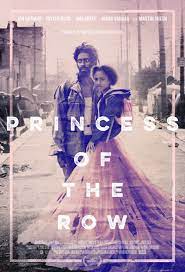
PRINCESS OF THE ROW
US, 2019, 85 minutes, Colour.
Edi Gathegi, Tayler Buck, Ana Ortiz, Jacob Vargas, Jenny Gago, Martin Sheen.
Directed by Van Maximillian Carlson.
The Row of the title is Skid Row in Los Angeles. An Iraq veteran, suffering from brain damage, lives in a tent, erratic in his behaviour, moments of lucidity, moments of violence, dependent on charity and help, eating meals on the ground.
The Princess of the title is Alicia, Tayler Buck, the veteran’s 12-year-old daughter who is meant to be in care, under the caring administration of Magdalene (Ana Ortiz) but who keeps going back to the Row to be with her father. He calls her Princess with reference to a fairy story about a Princess and the unicorn. Alicia has been writing short stories, even winning a local competition, focusing on the Princess and the unicorn.
The film presents a very strong picture of the difficulties of life in the street.
The question comes up about the responsibility of the daughter to her father, Alicia being very serious, avoiding being confined, continually returning to her father, getting food, going walking with him, avoiding the authorities. The film brings home the reality of this relationship and its difficulty quite powerfully.
At one stage, Alicia goes to live with an elderly couple, played by Martin Sheen, always a guarantee of social concern in his films, and Jenny Gago. He is a writer and commends Alicia. However, she steals from him, typing the word sorry, and going back to Los Angeles.
There is a very grim aspect of life on the street, especially sexual trafficking. An earnest man, seemingly of goodwill, gives his card to Alicia and she eventually approaches him, only to find that he is a pimp, prepares her for a client, but she screams and her father responds, bashing the client. However, they take the client’s money, buy clothes, food, go to a motel.
Ultimately, there is a scene where the father reaches out knocking his daughter over, her going to hospital, having to face reality, letting her father live on the street, and the audience seeing him quietly farewelling her, and her return then to the benevolent couple in the mountains.
- Part of the film? The visualising of the Princess and the unicorn, the opening, later when Alicia has to leave her father?
- A film of social concern, American veterans, PTSD, brain damage, race issues, living on the street? The consequences for children, relationship with father, with social services, education, fostering?
- Establishing the situation, the father, the flashbacks when he looked ordinary and telling stories to his daughter, his locks, the injured eye, his erratic behaviour, moments of lucidity, violence? The tent, his needs, sitting on the ground to eat? His daughter, her continued devotion, being with him, walking with him, providing for him? The strong bonds and her memories?
- Alicia, social services, her aunt abandoning her, Magdalene and her sympathy, finding accommodation? John and his wife, the visit, the comment about her short stories, their living 10 hours from Los Angeles, the comfortable home, the welcome to Alicia, his praise of her short stories, the stealing the money, typing sorry and leaving?
- The situation becoming more difficult? Managing her father? The sympathetic man with his card and offer of help? Contacting, his smooth talk, sexual trafficking, the dresses, make up, her agreeing, the ordinary -looking client, her reaction, screaming, her father coming in, bashing the client?
- Their taking the money, the motel, the diner, the food, going to the shop for clothes?
- Magdalene, getting Alicia to school, the school sequence? Her concern about her father, her father and the outburst, her wound, hospital, having to face reality?
- The sad farewell, his new tent on the Row, his realising what was happening, the quiet farewell in private?
- Alicia going to the couple, the welcome, her future?